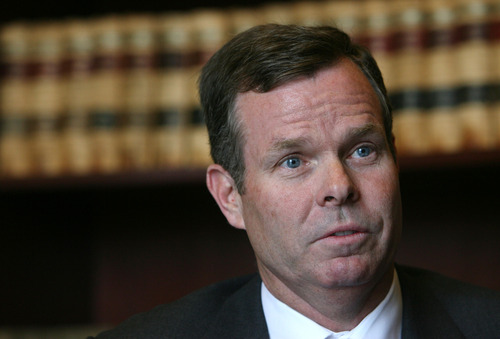This is an archived article that was published on sltrib.com in 2013, and information in the article may be outdated. It is provided only for personal research purposes and may not be reprinted.
The state records committee on Thursday ordered the Utah attorney general's office to disclose grand jury subpoenas it received from the federal authorities investigating John Swallow.
The office also must provide to The Salt Lake Tribune, emails and other communications discussing how to respond to those subpoenas. The records committee issued the ruling after an appeals hearing Thursday.
The hearing fell on the same day that an attorney for Swallow said he would not be prosecuted by the federal government, and that the prior attorney general, Mark Shurtleff, said he had been told he won't be prosecuted either. But the Utah State Records Committee, which hears disputes arising from public record requests, still heard two cases dealing with the attorney general.
In the subpoena case, Tribune reporter Robert Gehrke said the lawyers for the attorney general's office denied his records request by improperly interpreting a federal court rule barring the release of grand jury information. Utah law says state agencies cannot supply records the federal government says are confidential.
But the federal court rule applies to attorneys prosecuting a case, Gehrke argued.
"It's pretty clear any subpeonas served on the attorney general's office were served on them as a witness and not in their official capacity enforcing the law," Gehrke said.
Lana Taylor, a lawyer representing Swallow's office in the hearing, argued there are broad rules prohibiting the release of grand jury information. But Taylor could not explain how the office gave The Tribune copies of grand jury subpeonas in an unrelated case in 2012.
During deliberations, committee member Patricia Smith-Mansfield said she was "not persuaded" the subpeonas fell under the federal rule. Minutes later, she joined the 5-to-1 majority who ruled in The Tribune's favor.
The records are to be provided within 30 days of the order being served upon the newspaper and the attorney general's office. The AG's office still has the option of appealing the decision in state court.
In another hearing Thursday, the committee heard from City Weekly reporter Eric S. Peterson, who is seeking records on a matter also related to the scandals enveloping the Utah attorney general's office. Peterson wants emails and an investigation file concerning a development called Whitewater VII at the Draper FrontRunner station. The attorney general's office had been investigating the possibility of conflicts of interest between the Utah Transit Authority and developers since 2010. But this month it was announced the case had been sent to federal prosecutors because of a relationship Shurtleff has with project developer Mark Robbins.
Committee member Lex Hemphill asked Peterson if sending the case to federal prosecutors answered the questions about conflicts of interest and made his records request moot. Peterson said no.
"It's important to know if the conflict impacted the investigation," Peterson said.
The committee, earlier and in private, reviewed emails from the attorney general's office concerning Whitewater and found six should be disclosed to Peterson. But the committee postponed until its October meeting a decision on whether the investigative file should be given to Peterson. The committee wanted Peterson and Swallow's office to submit arguments on whether the federal grand jury rules — the same ones argued in the subpeona case — should be applied to the file.
Twitter: @natecarlisle



